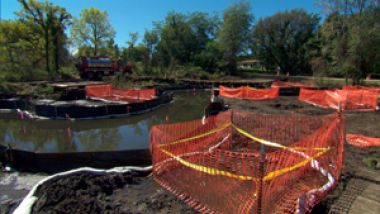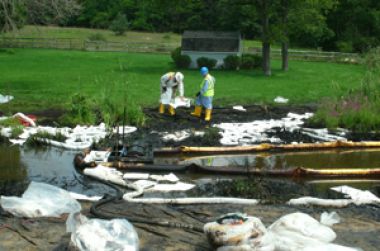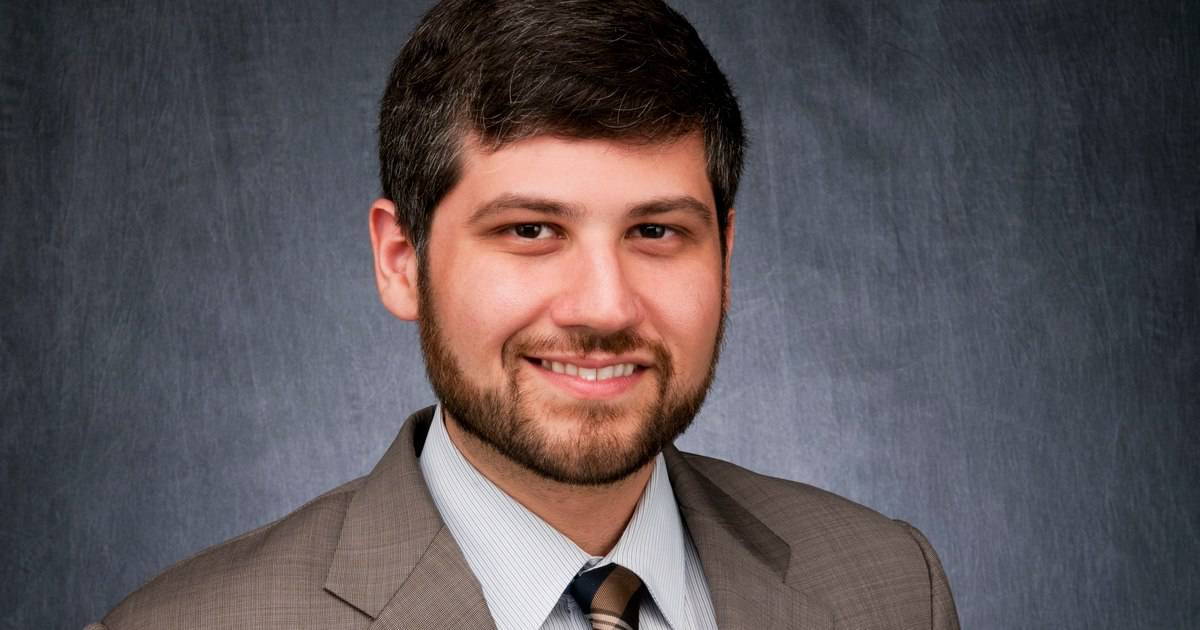Introduction


Phyllis Nelson defied her doctors’ predictions by surviving chronic lung disease for the last seven years, and until late July she had her symptoms under control with just a single puff a day from her inhaler.
Then came the oil spill — more than 800,000 gallons of crude from a broken pipeline spewing into the waterways near the trailer home park where she lives in Battle Creek, Mich. The spill forced Nelson and her neighbors to evacuate.
Now, Nelson says, she coughs up blood, battles sores in her nose, and takes 14 pills a day to keep her breathing from being constricted. Her neighbors report similar respiratory ailments, with some young children developing horrifying black spots on their skin.
The Michigan victims are now at the center of a congressional probe into the tactics that some oil companies use to shield themselves from legal liability following spills like the one that polluted the Kalamazoo River about 120 miles west of Detroit.
A joint investigation by the Center for Public Integrity and CBS News found numerous spill victims like Nelson signed waiver forms that released the Canadian-based pipeline operator Enbridge Inc. from all liability, or permitted the company to get their medical records.
Nelson signed such a form in return for $630 cash and an electronic air purifier she felt she needed to return safely to the home she evacuated. The 48-year-old unemployed mother of six, a high school dropout, said she and many of her neighbors on fixed incomes in the trailer park signed the forms because they were eager to return home and felt powerless against a big oil firm.
“They have the money to do whatever they want with whoever they want,” she said in a phone interview with the Center, tearing up as she gave her account. “They disrupt everyone’s lives, make everyone sick, give them [spill victims] a little money, pass the time and move on.”
Nelson and her husband are among several residents who also have sued in state court, seeking unspecified damages.
House Transportation Committee Chairman Jim Oberstar, D-Minn., has dispatched congressional investigators to the front lines of the Michigan leak, which despite its size was overshadowed this summer by the historic BP disaster in the Gulf of Mexico. The staffers are trying to determine if residents like Nelson were coerced or tricked into signing the liability waiver form or another form that released records of their entire medical history to the pipeline company.
“The medical release form is a deceitful way for Enbridge to limit its liability for the cost of medical care that may be incurred by victims of the company’s pipeline failure. With these forms, Enbridge is manipulating and exploiting people who trust the company to do the right thing,” Oberstar told the Center in a statement.
“Instead of avoiding its responsibility, Enbridge should step up and be accountable and responsive to the people in Michigan who have suffered injury or property damage.”
Jennifer Varey, spokeswoman at Enbridge, told the Center that the company disagrees with Oberstar’s claims. “Among our highest priorities, and second only to the cleanup of affected areas, has been our objective of ensuring that losses to residents affected by the oil spill are fairly compensated,” she said.
“We believe our process is fair and it is working.”
At the same time, Varey concedes that “some residents do not feel they have been treated fairly.” Enbridge recently named former Detroit Mayor Dennis Archer, an ex-state supreme court justice, to oversee and improve its claims process.
Enbridge Suspends Use of Forms
In a letter to Oberstar, Enbridge explained that the forms were part of a process designed to “balance the competing needs to get money into the hands of any impacted person versus encouraging false claims.”
“Our reimbursement and claims processes were established so that no one has to sue Enbridge and wait to be paid for costs or damages caused by this incident,” Enbridge Chief Executive Officer Patrick D. Daniel wrote Oberstar on Sept. 3.
Daniel wrote that the liability release form was supposed to be used for instances where victims seeking reimbursement for losses or expenses — including “perceived health conditions or inconvenience” — lacked documentation. If the form was used in other circumstances “we will correct those situations,” he said. Daniel said he was suspending the use of the liability forms until lawmakers’ concerns were resolved.
The medical records release forms, the Enbridge chief said, were used in consultation with local county health authorities; 17 victims signed them. The company has stopped using those release forms, and has returned any medical records it obtained.
Early last week, a lawsuit was filed in the Calhoun County circuit court alleging that residents at Baker Estates trailer park have suffered “head aches, nausea, burning and/or itchy eyes, skin rashes, sore threats, ear aches and dizziness” as a result of “exposure to the Defendants’ [Enbridge’s] heavy crude oil elements.”
A number of Baker Estates residents have signed on to the suit, including some who signed the Enbridge waivers. Mike O’Briant, the lawyer in the case, said he expects to have the waivers “voided as a result of duress.”
“Enbridge created the toxic atmosphere from the oil release,” O’Briant said. “My clients have very limited incomes and could not afford to vacate their homes or protect themselves from the fumes.”
“The only option left to them was to take the meager help offered by Enbridge. In return for a few days in a motel, expense money or an air filter, they were forced to sign releases without explanation.”
Oberstar hopes to air the stories of the victims at a congressional hearing later this week. He also has asked two Cabinet agencies — the Justice Department and the Department of Health and Human Services — to investigate whether the pipeline operator’s tactics violated any laws.
“Many of these residents have stated that they felt pressured to sign the release in return for air purifiers that they were led to believe would protect them from the health effects of benzene and other volatile hydrocarbons released in the air as a result of the spill, air conditioners, and reimbursement for hotel and other expenses as a result of the evacuation,” Oberstar said in a Sept. 1 letter to Attorney General Eric Holder. “Many of them have reported to the Committee that they had no idea what they were signing.”
Other Enbridge Pipeline Spills
Enbridge has suffered a number of recent pipeline spills. In 2007, two breaks in a pipeline owned by the Canadian company dumped 175,000 gallons of oil in Wisconsin. Later that year an Enbridge-operated pipeline caught fire, killing two workers in Minnesota. In January of 2010, an Enbridge pipeline leaked 126,000 gallons of oil in North Dakota.
And just last Thursday, the company was forced to shut one of its largest pipelines due to a leak near Romeoville, Ill. The leak from the pipe, buried five feet underground, contaminated local water supplies and could take weeks to clean up. It has also driven up gasoline prices throughout the Midwest. It’s unclear how much oil has leaked from that pipe.
At issue in the congressional investigation are two forms that residents near the spill said they were asked to sign in return for accepting small payments for their medical bills or obtaining the air purifier to combat the chemical benzene — a known carcinogen — that was leaked during the spill.
The liability release form stated that in return for the money, a victim “releases and discharges” Enbridge, its employees and officers “from and against all liability, claims, actions, causes of action, costs, and expenses, including without limitation claims for personal injuries, property damage, that Claimant(s) ever had, has or may have against the Enbridge released parties whether known or unknown related to the incident.”
The issue of legal waivers was brought up earlier this year in relation to the massive BP oil spill in the Gulf of Mexico. Kenneth Feinberg, the administrator of BP’s compensation program for those impacted by the spill, came under fire after reports surfaced that BP would require a waiver be signed barring further lawsuits against the company or its affiliates in exchange for lump-sum payments.
While Congress investigates the Enbridge waivers, health concerns remain for Phyllis Nelson and her community. She said sores have appeared on her husband’s skin, and noted that oil continues to sit on the river near her trailer.
“I grew up on the river, I learned how to fish and swim in that river. Forty-eight years of memories are gone because you can’t do it no more,” she said, nearly in tears. “It’s like I lost a friend.”
After living in a motel for a few days, Nelson eventually signed a waiver in order to get the air purifiers that would let her move back to her own home. “I didn’t want nothing more to do with them,” she said. Soon after, Nelson says she learned that despite Enbridge’s promise to buy her house, she was not eligible for a buyout.
“I just got tired of being in motel rooms and I said I want to go home, and they got real cocky and snotty,” she said. “They treated us really bad. They just think that if they give us a little bit of money that we’ll go away.”
Elsewhere in the complex, Anna Oberlin said that “everybody has dropped the ball in so many ways on this.” The 50-year-old resident said no one notified Baker Estates residents that the oil spill was dangerous or that she had to go into town on July 29, four days after the spill, to seek help.
Enbridge eventually promised to buy Oberlin’s trailer. But while searching for a new home, she says the company rescinded that offer, saying her trailer was outside the designated buyout area. Now she has nowhere else to go and has returned to her trailer — and to the smell that lingers over the whole area.
Enbridge spokesman Varey says the buyout offer “has always been extended to those whose property is within 200 feet of the shoreline.”
Oberlin suffers from headaches and occasional vomiting, and describes rashes breaking out on both her and her neighbors. “On kids it shows a little darker; on us it shows a little redder.”
“You feel like you’re a fighting a battle,” she said, “and nobody’s listening.”
Read more in Environment
Environment
Top pipeline regulator missing from Congressional hearing
Environment
Brain cancer trial may influence science on toxic chemical
Plastics Ingredient Vinyl Chloride is Focus of Suit Against Rohm and Haas


Join the conversation
Show Comments